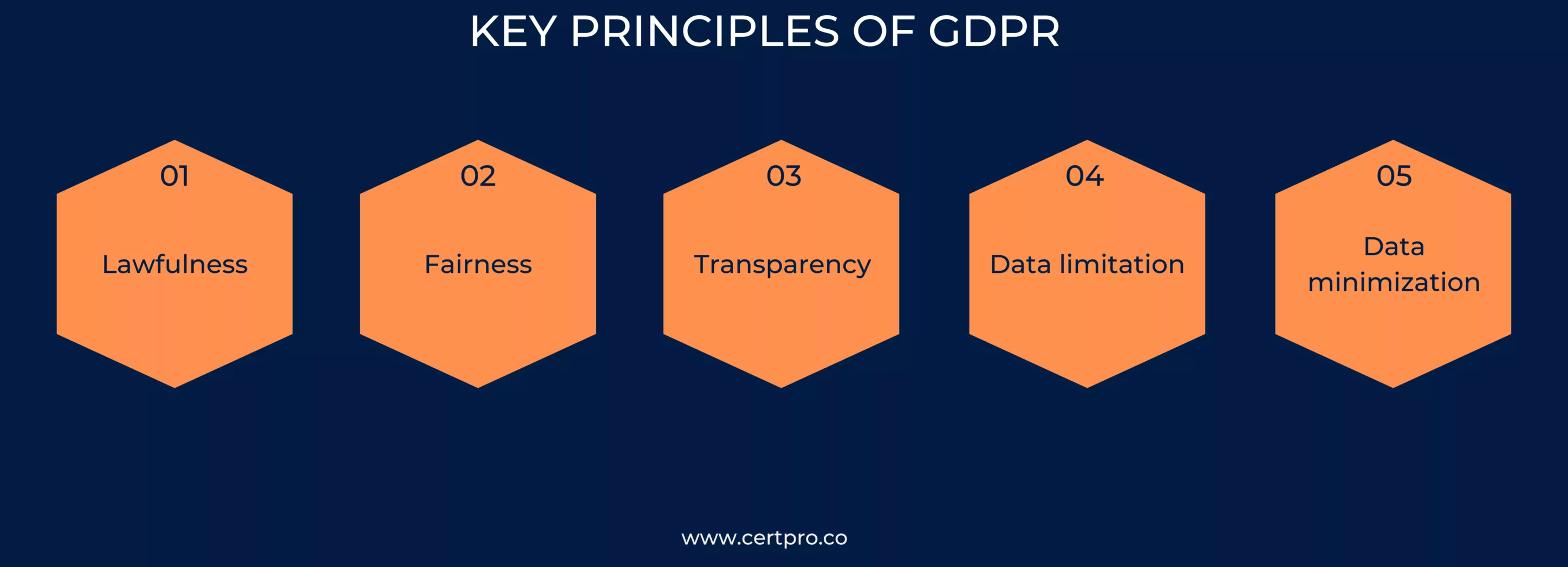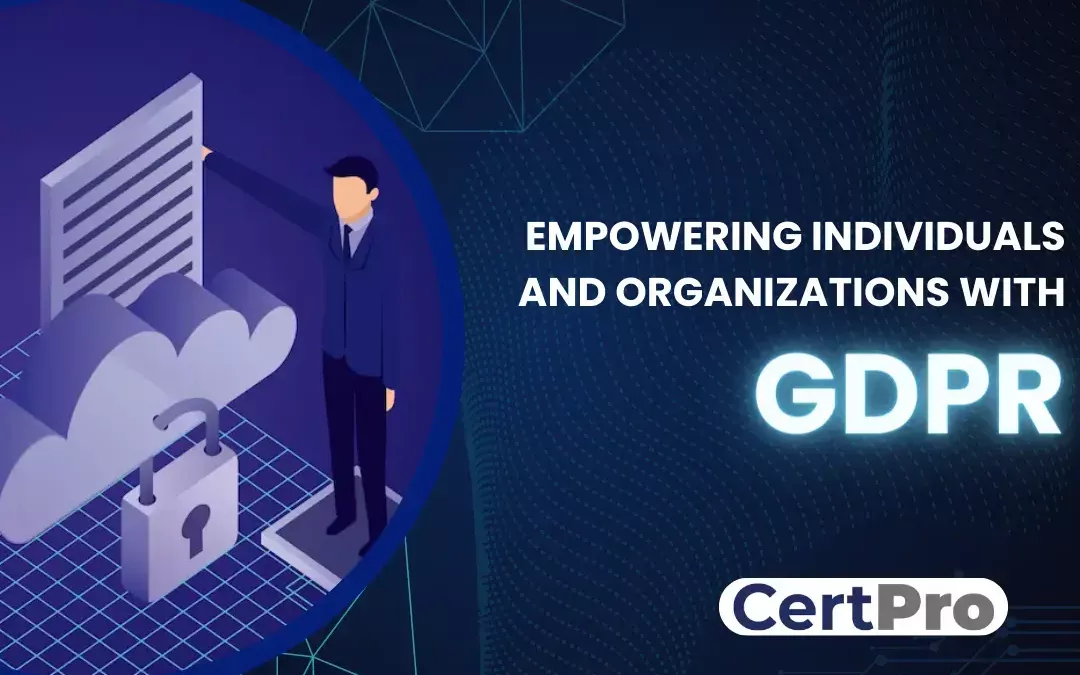In this era where personal data is a much more valuable asset than money, privacy has been a vulnerable commodity that needs to be kept safe. Safeguarding privacy has become more critical than ever. Entering the guardian of our digital age, the General Data Protection Regulation (GDPR).
GDPR has emerged as a powerful shield, granting individuals control over their personal information. It transformed the world into one where data is treated with reverence and transparency. No longer does an organization overlook the significance of privacy. It demands accountability at every step of the data journey. With its implementation, organizations can fortify their data protection practices. After all, privacy isn’t an option, and it shouldn’t be compromised.
The GDPR promotes innovation that combines technological improvements with respect for individual privacy by design and default. The seismic shift in data protection culture empowers individuals to exercise their rights. In this article, we are going to learn about GDPR and how it helps companies, consumers, and the protection of data. Additionally, we will introduce the rights under it. Without any delay, let’s jump into the article and demystify it.
WHAT IS GDPR?
The European Union (EU) passed the General Data Protection Regulation, also known as GDPR, which is a comprehensive data protection law to safeguard and protect people’s personal data. It came into effect on May 25, 2018, replacing the previous Data Protection Directive 95/46/EC.
The developers of the GDPR aimed to address the issues arising from the digital era, the rapid advancement of technology, and the increasing collection, processing, and sharing of personal data. They focused on strengthening individual data privacy and establishing a consistent framework for data protection among EU member states.
All organizations, both inside and outside the EU, that gather, handle, or keep personal data about EU citizens are subject to the rule. Due to the GDPR’s expansive territorial reach, all businesses that handle the personal data of EU citizens are required to abide by its requirements. Depending on the kind and severity of the breach, non-compliance with the standard may result in harsh penalties, such as fines of up to €20 million or 4% of worldwide annual revenue, whichever is greater.
KEY PRINCIPLES OF GDPR
According to the General Data Protection Regulation (GDPR), the core principles of data processing are lawfulness, fairness, and transparency. These guidelines help organizations handle personal data in a way that protects individuals’ rights and interests. Let’s delve deeper into each principle:
Lawfulness: In fulfillment of Article 6 of the GDPR, data processing must be done on legitimate grounds. Organizations are required to establish a legitimate legal basis for processing personal data, such as the subject’s consent, the need to process the data for the performance of a contract, compliance with the law, protection of vital interests, tasks carried out in the public interest, or the data controller’s or a third party’s legitimate interests.
Fairness: This indicates that the processing of personal data should be open, reasonable, and respectful of people’s rights and expectations. Organizations must make sure that data processing is done equitably, without the use of unfair or discriminatory tactics. Individuals should have a reasonable expectation of how their data will be used and should be informed about the purpose and substance of the processing.
Transparency: Establishing trust between individuals and organizations requires transparency. Organizations are required to disclose accurate and easy-to-understand information on the aims, legal justifications, and duration of their data processing activities. People should be educated about their rights as well as how to exercise them. Transparency also entails telling people about any changes to data processing procedures and any third parties who may be involved.
Data limitation: Personal data should only be acquired for specific, clear, and justifiable objectives. This implies that organizations must have a specific, legitimate reason for collecting and using people’s personal information. They also need to let people know about this. The information gathered must be sufficient, pertinent, and restricted to what is required to fulfill those particular goals. Without getting further consent or proving a legal basis, organizations should not use the data for additional purposes that are incompatible with the original purpose.
Data minimization: It is the practice of just collecting and retaining the minimum amount of personal information required to fulfill the identified goals. Organizations should simply gather the bare minimum of personal information necessary to achieve their goals. They should refrain from gathering an excessive amount of unnecessary or unrelated data that isn’t directly related to the goal. Organizations should also periodically examine and delete any personal data that is no longer needed or mandated to be kept.
Organizations must evaluate and record the extent and purpose of their data processing operations, periodically review their data retention rules, and put the necessary organizational and technological controls in place. These actions guarantee adherence to the GDPR’s criteria for purpose restriction and data minimization. These principles ensure that personal data is treated lawfully, fairly, and transparently while protecting individuals’ rights and privacy and according to the strict standards of the GDPR.

RIGHTS OF INDIVIDUALS UNDER GDPR
The General Data Protection Regulation (GDPR) is a revolutionary framework that grants people a wide range of rights. With these rights, people may control how their personal information is used and hold companies responsible. Let’s now examine the eight essential rights protected by GDPR.
1. Right to be informed: Individuals have a right to information about how their personal data is collected, processed, and used. Organizations must be open and honest when disclosing information about their goals, legal basis, time frame for data retention, and beneficiaries.
2. Right to access: Consumers have the right to ask companies to clarify whether they are processing their personal data and, if so, to access such data. They can ask for a copy of their personal data as well as details regarding its usage.
3. Right to rectification: Individuals have the right to request that organizations correct inaccurate or incomplete personal information they are maintaining. They can ask for the correction of their data if they think it is incomplete or inaccurate.
4. Right to erasure or Right to be Forgotten: In some situations, people have the right to ask that their personal data be erased. This includes scenarios in which the data was improperly handled, the person withdrew consent, or the data was no longer required for the reason for which it was gathered.
5. Right to restriction of processing: Individuals have the right to ask for the limitation of the processing of their personal data under certain circumstances. As a result, businesses are only permitted to keep the data; no further uses are permitted.
6. Right to data portability: The right to obtain personal information in a structured, widely used, and machine-readable format belongs to each individual. In cases where it is technically possible, they can also ask that their data be transferred directly from one entity to another.
7. Right to object: Individuals have the right to object to the processing of their personal data, including profiling and direct marketing.
8. Rights in Relation to Automated Decision-Making: People have the right to be free from important decisions that are exclusively based on automated processing, including profiling. Individuals should have the right to object to and request human involvement in such decision-making processes, excluding certain circumstances.
These rights provide people with the ability to manage their personal information and actively participate in the preservation of their privacy and data. Organizations are required to uphold and support the exercise of these rights by providing avenues for requests to be made and guaranteeing prompt and suitable answers.
DATA BREACHES AND SECURITY UNDER GDPR
The risk of breaches and unauthorized access is significant in a data-driven, interconnected world. Together, let’s explore how GDPR empowers individuals and organizations alike to protect sensitive information, fostering a future where data is shielded and privacy prevails.
The General Data Protection Regulation (GDPR), which aims to safeguard personal data against unauthorized access, loss, modification, or disclosure, places a high priority on security. Key GDPR security considerations include the following:
Data protection: Organizations must put these safeguards in place to prevent the accidental or intentional loss, destruction, modification, disclosure, or access of personal information. These precautions ought to be in line with the type, extent, context, and goals of the processing as well as the hazards present.
Risk analysis and Data Protection Impact Assessment (DPIA): Organizations must carry out risk analyses to pinpoint possible weak points and gauge how processing personal data may affect people’s rights and liberties. A Data Protection Impact Assessment (DPIA) is required for processing operations that involve a high level of risk. Organizations may detect and reduce possible dangers to personal data using DPIA.
Confidentiality, Integrity, and Availability: Organizations are required to protect these three aspects of personal data. This includes taking action to stop unwanted access, preserving the quality and dependability of the data, and making sure the data is available when needed.
Accountability and Documentation: The GDPR places a strong emphasis on the idea of responsibility by forcing businesses to provide proof that they are abiding by their security commitments. This entails keeping track of data processing operations, putting security rules and procedures into place, and carrying out frequent audits to verify continuing compliance.
Organizations may reduce risks, preserve personal data, and adhere to GDPR security regulations by giving security measures a high priority and putting them in place. This promotes confidence between businesses and users in the digital ecosystem and provides a greater degree of data protection.
REACH OUT FOR EXPERT ASSISTANCE
CertPro is a comprehensive platform that aids organizations in achieving GDPR compliance by providing features designed to simplify and streamline the compliance process. Organizations can streamline their compliance efforts, maintain documentation, manage data subject requests, mitigate risks, and ultimately achieve and maintain GDPR compliance more efficiently and effectively.
FAQ
WHAT ARE THE PENALTIES FOR NON-COMPLIANCE WITH GDPR?
Non-compliance with GDPR can result in significant administrative fines imposed by supervisory authorities. The fines can be up to €20 million or 4% of global annual turnover, depending on the nature and severity of the violation.
WHAT ACTIONS MAY BUSINESS TAKE IN ORDER TO BE COMPLIANT WITH GDPR?
Data audits, the implementation of suitable organizational and technical data protection measures, the documentation of data processing activities, the acquisition of valid consent, the adoption of security measures, and the appointment of a Data Protection Officer (DPO)
HOW MANY ARTICLES ARE THERE IN GDPR?
The General Data Protection Regulation (GDPR), which is made up of 99 separate Articles, allows EU individuals to choose who can access, acquire, process, manage, or distribute their “personal data.” There are 11 Chapters that make up the 99 Articles of the General Data Protection Regulation.
WHICH ACTIVITIES ARE EXEMPT FROM THE GDPR?
In brief, if your company operates outside of the EU, doesn’t process personal data, or solely processes data domestically, the EU’s General Data Protection Regulation (GDPR) does not apply to you.
WHAT NATIONS ARE COVERED BY THE GDPR?
The European Union (EU)’s 27 member nations are all subject to the EEA GDPR. The European Economic Area (the EEA) as a whole is also covered. Iceland, Norway, and Liechtenstein are all part of the EEA, a region that is bigger than the EU.

About the Author
SUBBAIAH KU
Subbaiah Ku is the Regional Director for CertPro in Oman, bringing a wealth of expertise in process and system auditing. As a seasoned lead assessor, Subbaiah is dedicated to ensuring the highest standards in compliance and security. His unique blend of technical acumen, rooted in Mechanical Engineering, is complemented by a diverse range of certifications and extensive training.
HOW TO CONDUCT A GDPR AUDIT FOR MY BUSINESS?
The General Data Protection Regulation (GDPR) is vital for today's digital landscape. It is a cornerstone for safeguarding people's privacy rights in the European Union (EU). Therefore, organizations dealing with EU residents' data must follow these GDPR rules....
GDPR DATA BREACH NOTIFICATION: THE ULTIMATE GUIDELINE FOR SECURING DATA
Modern businesses require incorporating personal data protection strategies to ensure customer satisfaction and business growth. In this respect, the European Union's General Data Protection Regulation (GDPR) sets strict standards for maintaining data security....
GDPR Compliance Software: Boosting Business Efficiency
Handling large amounts of personal data has become a significant concern in today's digital landscape, necessitating a thorough understanding of the intricate legal framework, particularly within the European Union. An essential piece of legislation in this regard is...




